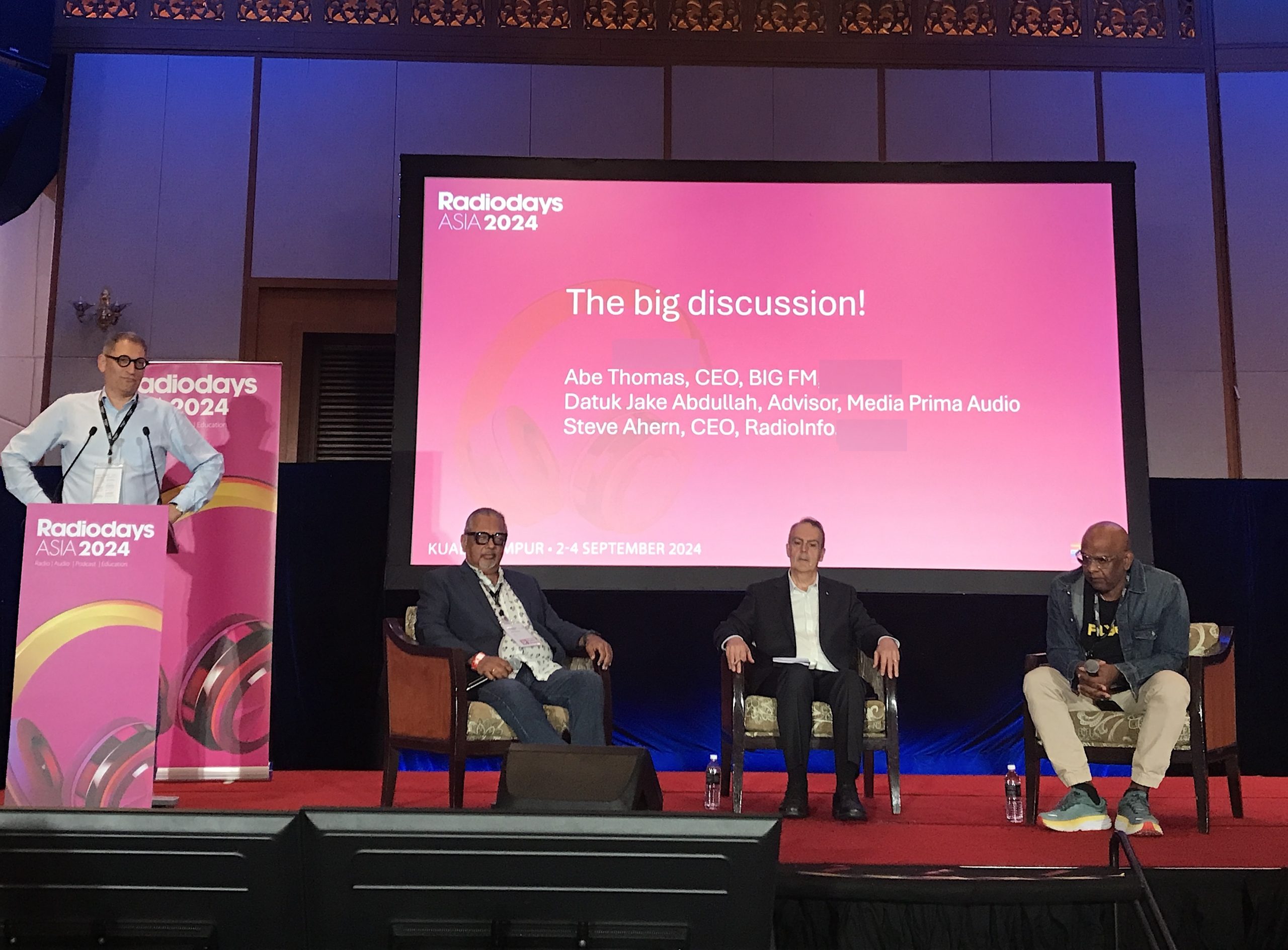Strategy, technology, innovation and monetisation were the four main topics on the agenda in the RadioDays Asia Big Discussion session when radioinfo’s Steve Ahern led the conversation with Abe Thomas and Jake Abdullah.
Abe Thomas, CEO of BIG FM and Jake Abdullah, fomer Astro CEO and now advisor to Media Prima Audio, shared their views on the four industry pillars in the fast changing media landscape across Asia.
“One way we encourage innovation in our organisation is by focusing on an Innovation of the Month,” said Abe. “Recently we trialled using Dhun to create and produce a song for friendship day. The key learning was the importance of using prompting to get the desired product.”
“Innovation is key in Media Prima,” said Jake. “We are the first to initiate an AI D.J. We need to look at AI from the macro side not just the audio… AI will replace people who don’t know AI.”
Steve urged delegates to “embrace the technology, understand and know how to use new innovations such as AI.”
Jake, who is also an executive coach, responded, “as a coach for CEO’s I begin my day at 5am and I work without digital devices until 6.30 am, but I also maintain a good online profile. I’m enjoying building a following and having the opportunity to persuade and improve someone’s life.”
“There’s talk about advertising money decreasing”, said Steve. “Is monetization more difficult at the moment?”
Abe said listenership is growing but advertisers have more choices where to spend their money. “Radio is growing every year. Radio is a medium that seamlessly integrates and amplifies other mediums. Radio is now in the age of personalisation, we must communicate that message to retain advertising.”
Abe also suggested tapping into the trends for influencer marketing, satisfing the demand for micro-level activations and harnessing digital assets such as social media, commerce and gameification.
“Attention is currency. We’re all fighting for the same attention, 94% of all Malaysian’s are connected.
“TiKToc is the fastest growing social media, AI influencers are now in the market… We have to think about the requirements of advertisers to be integrated,” said Jake.
Steve asked about changing media buying trends. Abe said, “We shouldn’t sell only radio or only digital, we must sell ideas that come from and include audio and digital, then advertisers will be convinced.”
“Big influencers are making money on social media. Do we want them in radio? asked Steve.
Abe said his station, Big FM in India, has now developed new deals with the talent that recognise what they bring to the station and share revenue appropriately.
Jake said influencers are important but it depends on their credibility because people are now becoming more skeptical of influencers. “Micro influencers are dependent on how credible they are.”
Commenting on trusted personalities Jake said there are different levels of trust in Malaysia. “In rural areas, public broadcaster personalities have an advantage.”
“Brands that have a well articulated purpose are trusted… Influencer marketing is about content not followers,” said Abe.
“If trust is eroded, what do we have to offer in this sea of misinformation?” asked Steve.
The pair agreed that regulations and compliance are an important part of trust. The radio industry has long ago worked out how to meet its social obligations. “We don’t discuss politics and religion on radio in Malaysia, but unregulated podcasts can discuss anything. Whatever you like to consume a podcast will give it to you.”
Talking big picture strategy, Abe said: “For great execution you need a great culture in the business… every individual needs to be aligned with what we have to do.”
the strategy for media companies must be focused on audience attention, according to Jake. “I’m always competing for your attention. What are your triggers? For example empathy, can I harness that to keep you listening or watching longer… I’m winning when I have their attention.”

